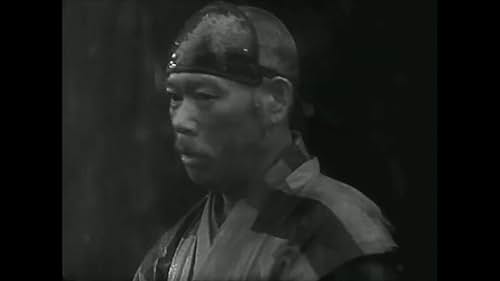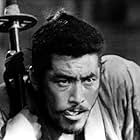Farmers from a village exploited by bandits hire a veteran samurai for protection, and he gathers six other samurai to join him.Farmers from a village exploited by bandits hire a veteran samurai for protection, and he gathers six other samurai to join him.Farmers from a village exploited by bandits hire a veteran samurai for protection, and he gathers six other samurai to join him.
- Nominated for 2 Oscars
- 5 wins & 9 nominations total
Toshirô Mifune
- Kikuchiyo
- (as Toshiro Mifune)
Yukiko Shimazaki
- Wife
- (as Yukio Shimazaki)
Isao Kimura
- Katsushiro
- (as Ko Kimura)
Kokuten Kôdô
- Old Man Gisaku
- (as Kuninori Todo)
- Director
- Writers
- All cast & crew
- Production, box office & more at IMDbPro
Storyline
Did you know
- TriviaAkira Kurosawa's original idea for the film was to make it about a day in the life of a samurai, beginning with him rising from bed, eat breakfast, go to his master's castle and ending with him making some mistake that required him to go home and kill himself to save face. Despite a good deal of research, he did not feel he had enough solid factual information to make the movie. He then pitched the idea of a film that would cover a series of five samurai battles, based on the lives of famous Japanese swordsmen. Hashimoto went off to write that script, but Kurosawa ultimately scrapped that idea as well, worrying that a film that was just "a series of climaxes" wouldn't work. Then, producer Sôjirô Motoki found, through historical research, that samurai in the "Warring States" period of Japanese history would often volunteer to stand guard at peasant villages overnight in exchange for food and lodging. Kurosawa then came across an anecdote about a village hiring samurai to protect them and decided to use that idea. Kurosawa wrote a complete dossier for each character with a speaking role. In it were details about what they wore, their favourite foods, their past history, their speaking habits, their reaction to battle and every other detail he could think of about them. No other Japanese director had ever done this before.
- GoofsIn the closing moments of the final battle, the bandits fire two musket shots only seconds apart. It is clear from the plot that at that point they possess only one musket. The black powder muskets of the age required much more time to reload. This error was pointed out in the commentary of the deluxe DVD edition.
- Quotes
Kambei Shimada: This is the nature of war: By protecting others, you save yourselves. If you only think of yourself, you'll only destroy yourself.
- Alternate versionsThe film's original Japanese release version runs 207 minutes, plus intermission, which includes four minutes of entr'acte music against a blank screen. This is the version that has been generally shown worldwide since the 1980s, though sometimes it is shown without the intermission and entr'acte, resulting in a listed running time of 203 minutes. The initial U.S.A. release was re-titled 'The Magnificent Seven' and released November 1956, with English subtitles, and ran 158 minutes. Some European releases were even further shortened to 141 minutes. Landmark Films re-released the film in the U.S. in December 1982, the first time outside Japan the film saw a major release with its running time intact (although the intermission and entr'acte were removed). Later U.S.A. releases by Avco-Embassy Pictures, Janus Films, and Films Incorporated, and by BFI in the UK, are also the full original version of the film.
- ConnectionsFeatured in Objective 500 Million (1966)
Featured review
Akira Kurosawa was and is considered the master of east-western film-making (in that he made his Japanese films accessible for fans of American westerns while still making the movies his country found popular), and out of the few Kurosawa movies I've had the pleasure of viewing (Hidden Fortress, Rashomon, and this) I'd have to say that while Rashomon is still my favorite, I nevertheless had a blast during this one. The story has become quite influential to filmmakers from the likes of John Sturges (The Magnificent Seven) to John Lasseter (A Bug's Life): a small village has been terrorized by bandits for far too long, amid times of civil war in the nation, and so on the advice of Grand-Dad, they decide to hire four - which soon becomes seven - samurai for the job. There's no money, just food and honor, even though the village isn't exactly pleased to have samurai back in their village. Each character is drawn and executed compellingly, though for my money Toshiro Mifune proves why he became one of Japan's most notorious film actors. His work as the brave, bold outcast of the seven is awe-inspiring practically all the way through, like the hero of a western that anyone can root for since he's a true rebel at heart within a group of men with a task at hand.
Kurosawa directs his tale and main and supporting players like a grand composer, orchestrating a vivid story and extracting from great actors like Takashi Shimura (the old, wise Samurai), Ko Kimura (the disciple Samurai), Daisuke Kato (Schichiroji), and Mifune (Kikuchiyo, which isn't his real name) just the right touches of humanity, humor, tragedy, romance, and intensity. The overall intensity, by the way, isn't over-estimated; its long length (almost 3 1/2 hours) isn't distracting in the slightest since Kurosawa's editing and photography (the later helmed by Asakazu Nakai) are extraordinary. Not to compare the two films, but one thing I saw in common with Seven Samurai and a Lord of the Rings film is that, if anything else, it definitely isn't a boring experience. Along with a score by Fumio Hayasaka that gives the film just a bit more of a pulse, and a showdown that is relentless with excitement, this is one of the must-see action films for film buffs, or anyone with an serious interest in having fun with an epic.
Kurosawa directs his tale and main and supporting players like a grand composer, orchestrating a vivid story and extracting from great actors like Takashi Shimura (the old, wise Samurai), Ko Kimura (the disciple Samurai), Daisuke Kato (Schichiroji), and Mifune (Kikuchiyo, which isn't his real name) just the right touches of humanity, humor, tragedy, romance, and intensity. The overall intensity, by the way, isn't over-estimated; its long length (almost 3 1/2 hours) isn't distracting in the slightest since Kurosawa's editing and photography (the later helmed by Asakazu Nakai) are extraordinary. Not to compare the two films, but one thing I saw in common with Seven Samurai and a Lord of the Rings film is that, if anything else, it definitely isn't a boring experience. Along with a score by Fumio Hayasaka that gives the film just a bit more of a pulse, and a showdown that is relentless with excitement, this is one of the must-see action films for film buffs, or anyone with an serious interest in having fun with an epic.
- Quinoa1984
- Dec 6, 2003
- Permalink
Details
Box office
- Budget
- ¥125,000,000 (estimated)
- Gross US & Canada
- $820,278
- Opening weekend US & Canada
- $15,942
- Jul 28, 2002
- Gross worldwide
- $1,076,062
- Runtime3 hours 27 minutes
- Color
- Sound mix
- Aspect ratio
- 1.37 : 1
Contribute to this page
Suggest an edit or add missing content






















